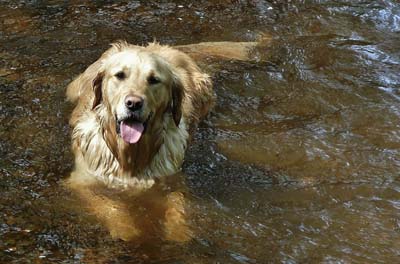
“Ugh, dog, you stink!”
Ever say that to your furry bestie when he comes for a snuggle straight from the rain, sprinkler, pool or pond? You’re not imagining it – even if you thought your dog needed a bath before he jumped in the lake, “wet dog smell” is definitely worse.
Like all animals – including people – dogs have microorganisms living on their skin. In the case of dogs, these include yeast and bacteria, which digest the natural oils of the dog’s coat, and give off organic acids as waste products. When dry, these particles don’t smell too much, but when they dissolve in water and take their truly acidic form, that’s when they get pungent.
On top of that, once they are dissolved in water, the particles can escape your dog’s coat and float around in the air – making the smell seem even stronger, and creating a “cloud of stink” effect around your dog.
Wet-dog smell is inevitable, but there are some things you can do to keep your dog cleaner, healthier – and less smelly:
- Regular brushing distributes the natural oils throughout the coat, rather than letting them build up next to the skin. It also helps remove excess oil, giving the bacteria and yeast less to munch on. Bonus: this will make your dog’s coat shiny and healthy, and reduce the amount of loose hair around the house!
- You might also consider the occasional use of a dry shampoo that is formulated for dogs – talk to your veterinarian since not all products are created equally.
- Wash your dog’s bedding and blankets frequently. This helps cut down on rank breeding ground for the microorganisms, keeping them to a natural level.
- Bathe your dog or take him to the groomer periodically. Again, only use products formulated for dogs. Shampoos and conditioners made for another species, including humans, could cause bigger problems. Also, don’t over-bathe – too many baths can strip out too much oil, leaving your dog dry and itchy. This can also lead to big problems, like hot spots and sores.
Finally, remember that if your dog smells particularly bad and you can’t make a difference with these tips, or if his smell is just different and strange, there could be a medical issue. Infections cause bad odors, so when in doubt, talk to your veterinarian.

